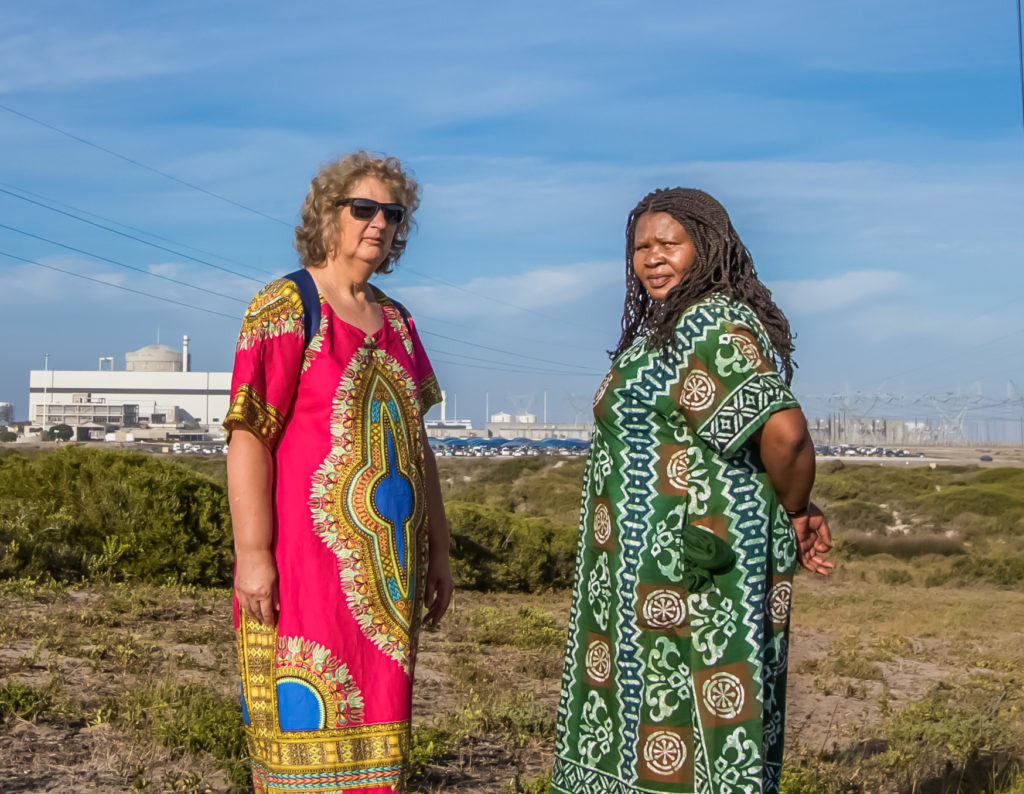
Source: New Internationalist
Two South African women, Makoma Lekalakala and Liz McDaid, today have won the Goldman Environmental Prize, the world’s largest award honouring grassroots environmental activists, for stopping their government’s massive secret nuclear deal with Russia – a deal that would have threatened the country’s health, environment and finances.
Their improbable victory against the powerful nuclear industry and South African government shows that, in McDaid’s words, ‘people can make a difference and that the country will not be sold to the highest bidder. It is a victory for democracy,’.
Both women, who have been fighting injustice most of their lives, were interviewed in London last week, while on their way to collect their award in San Francisco.
Exposing corruption
In 2014, under the leadership of President Jacob Zuma, South Africa’s government made a secret deal with Russia to build eight to ten nuclear power stations throughout the country (currently the country has one station, operated by the state-owned electricity utility, Eskom). The $76 billion deal was unprecedented in scope and cost, and its terms assigned all liability for nuclear accidents to South Africa.
It looked like a done deal, but the two women stood in the way.
‘I work with women who don’t have access to electricity – they cannot afford to pay for it – so building a trillion rand nuclear power project with taxpayers’ money was never going to be the answer,’ said Lekalakala, 52, the director of the environmental organization Earthlife Africa.
Research has shown that nuclear is not needed for the country’s energy future, added McDaid, 55, climate change coordinator for Southern African Faith Communities’ Environment Institute (SAFCEI), which had long advocated for renewable energy to address climate change and had taken a stance against South Africa’s nuclear industry.
The women started asking how the government was making decisions about the country’s energy needs, and when they started scrutinizing the processes, they uncovered unlawful activities. Earthlife Africa obtained a copy of the secret South African-Russian agreement, which they shared with the Mail & Guardian, who published it in February 2015. The newspaper investigation uncovered more corruption and misconduct.
Both women decided they had to act. ‘You just don’t roll over when wrongdoing happens: you fight,’ McDaid said.
So Lekalakala, who is from Johannesburg, and McDaid from Cape Town, pooled their shoestring budgets, resources of skill and constituency within their small environmental NGOs to create a formidable collaboration. Along with their organizations, they highlighted the health and environmental risks, and financial implications from this massive nuclear upscaling.
For more than two years, they woke up early every Wednesday to greet ministers with anti-nuclear banners as their shiny black cars approached Parliament. Sometimes, it was just McDaid in the rain, sometimes they were dozens of protestors. They also organized pickets in front of the department of environmental affairs and the state-owned energy company Eskom, as well as countless protests, rallies, public meetings and petitions.
Seeking a just energy future
In the process, they built a broad coalition of various interest groups: women’s groups, youth groups, civic society groups, organizations against corruption, religious groups, trade unions and businesses. ‘So many different people and so many different organizations got involved. They could relate to what we were doing, they could see the impact of the deal on their own lives,’ Lekalakala said.
‘It started with the environment, but now, it’s a whole movement for a more just future: us standing up and holding our government accountable in a democracy. And the movement keeps growing,’ McDaid added.
Along with their organizations, the two women also took the Zuma government to court on the grounds that the deal had been kept secret and bypassed legal process, without any public consultation or parliamentary debate. For many people, the deal was emblematic of the lack of transparency and corruption in the Zuma government in which a few people benefited while the rest paid the price. ‘The nuclear deal was never about energy. It was about the greed of a few individuals,’ as McDaid puts it.
The court battle was fought over a year and a half. But on April 26, 2017, the Western Cape High Court ruled that the nuclear power project was unconstitutional, invalidating the agreement and stopping the nuclear programme. The landmark legal victory also means that any new nuclear deals for South Africa have to be disclosed and approved by Parliament.
‘When the judge made the announcement that we got everything we had asked for, I broke down in tears,’ remembered Lekalakala. ‘And I shouted right there in court, although I knew that you have to keep silent in court,’ added McDaid.
‘So many times we thought that the forces against us were too great. Our first court appearance got postponed and we were running against time. They attempted to block us, to wear us out, to make us run out of money (we did run our of money, but our legal team were amazing: they kept carrying on), but all this only made us more determined to fight,’ said McDaid.
Despite their huge victory, the women fear that the nuclear build could be resurrected once more funding becomes available. So they are continuing their campaign and are calling on the new South African government to remove the entire nuclear build development from its integrated energy plan.
Yet Lekalakala and McDaid are optimistic, believing that their campaign for a transition to a low carbon economy with a decentralized and socially-owned energy supply has never had a better chance of success. ‘The science and the economy are on our side,’ said Lekalakala. ‘The international community agreed that we have reached an unprecedented level of greenhouse gas, so we need to act quickly – there are alternatives to fossil fuels that are more beneficial for the planet and individuals. The world is changing. Everyone is pushing for renewable energy.’
